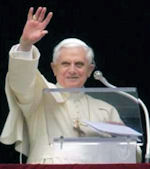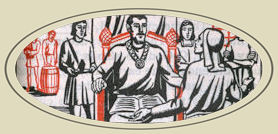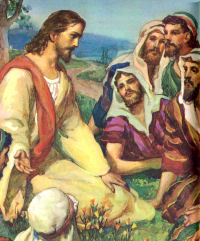Make your gift today!
Help keep Catholics around the world educated and informed.
Already donated? Log in to stop seeing these donation pop-ups.
» Enjoy our Liturgical Seasons series of e-books!
During the fourth watch of the night, he came toward them walking on the sea. When the disciples saw him walking on the sea they were terrified. "It is a ghost," they said, and they cried out in fear. At once Jesus spoke to them, "Take courage, it is I; do not be afraid" (Matt. 14:25-27).
Click here for commentary on the readings in the Extraordinary Form of the Roman Rite.
Pope Benedict's Angelus Address
 In this Sunday’s Gospel we find Jesus who, after withdrawing to the mountain, prays throughout the night. The Lord, having distanced himself from the people and the disciples, manifests his communion with the Father and the need to pray in solitude, far from the commotion of the world.
In this Sunday’s Gospel we find Jesus who, after withdrawing to the mountain, prays throughout the night. The Lord, having distanced himself from the people and the disciples, manifests his communion with the Father and the need to pray in solitude, far from the commotion of the world.
This distancing, however, must not be seen as a lack of interest in individuals or trust in the Apostles. On the contrary, Matthew recounts, Jesus made the disciples get into the boat, “and go before him to the other side” (Mt 14:22), where he would see them again. In the meantime the boat “was many furlongs distant from the land, beaten by the waves; for the wind was against them” (v. 24). And so in the fourth watch of the night [Jesus] came to them, walking on the sea” (v. 25); the disciples were terrified, mistaking him for a ghost and “cried out for fear” (v. 26). They did not recognize him, they did not realize that it was the Lord.
Nonetheless Jesus reassured them: “Take heart, it is I; have no fear” (v. 27). This is an episode from which the Fathers of the Church drew a great wealth of meaning. The sea symbolizes this life and the instability of the visible world; the storm points to every kind of trial or difficulty that oppresses human beings. The boat, instead, represents the Church, built by Christ and steered by the Apostles.
Jesus wanted to teach the disciples to bear life’s adversities courageously, trusting in God, in the One who revealed himself to the Prophet Elijah on Mount Horeb “in a still small voice” [the whispering of a gentle breeze] (1 Kings 19:12).
The passage then continues with the action of the Apostle Peter, who, moved by an impulse of love for the Teacher, asks him to bid him to come to him, walking on the water. “But when he saw the wind [was strong], [Peter] was afraid, and beginning to sink he cried out, ‘Lord, save me!’” (Mt 14:30).
St Augustine, imagining that he was addressing the Apostle, commented: the Lord “leaned down and took you by the hand. With your strength alone you cannot rise. Hold tight to the hand of the One who reaches down to you” (En. in Ps. 95, 7: PL 36, 1233), and he did not say this to Peter alone but also to us.
Peter walks on the water, not by his own effort but rather through divine grace in which he believes. And when he was smitten by doubt, when he no longer fixed his gaze on Jesus but was frightened by the gale, when he failed to put full trust in the Teacher’s words, it means that he was interiorly distancing himself from the Teacher and so risked sinking in the sea of life.
So it is also for us: if we look only at ourselves we become dependent on the winds and can no longer pass through storms on the waters of life. The great thinker Romano Guardini wrote that the Lord “is always close, being at the root of our being. Yet we must experience our relationship with God between the poles of distance and closeness. By closeness we are strengthened, by distance we are put to the test” (Accettare se stessi, Brescia 1992, 71).
Dear friends, the experience of the Prophet Elijah who heard God passing and the troubled faith of the Apostle Peter enable us to understand that even before we seek the Lord or invoke him, it is he himself who comes to meet us, who lowers Heaven to stretch out his hand to us and raise us to his heights; all he expects of us is that we trust totally in him, that we really take hold of his hand.
Let us call on the Virgin Mary, model of total entrustment to God, so that amidst the plethora of anxieties, problems and difficulties which churn up the sea of our life, may our hearts resonate with the reassuring words of Jesus who also says to us “Take heart, it is I; have no fear!”; and may our faith in him grow. – August 7, 2011
Sunday Readings
The first reading is taken from the first Book of Kings 19:9a, 11-13a and relates the story of Elijah in the cave and the Lord coming to him in a "still small voice."
The second reading is from the Letter of St. Paul to the Romans 9:1-5 in which St. Paul speaks of the sorrow of heart that he has because the Jews, as a nation, had refused to see Christ as the Messiah who was promised to them by God through their patriarchs and prophets.
The Gospel is from St. Matthew 14:22-33. Our Lord sent His disciples to row across the lake, knowing that they would meet strong, gale-force head-winds and be in danger. He did this because He wanted to strengthen their faith and trust in Himself. He intended to come to them at the right moment, working two miracles — walking on the water and calming the storm. This He did and the result was as He had intended — their faith in Him was strengthened, they declared He was the Messiah, the Chosen of God. Peter, already the recognized leader, and always the most daring among them, showed himself ready to risk drowning in order to prove his trust and confidence in Christ. While he trusted in Christ, all went well, but when his faith weakened he would have been lost were it not for the outstretched helping hand of his master. This was also a very necessary lesson in the education of Peter and his companions.
For us, too, there is a necessary lesson in this incident. It is that we must continue to trust in Christ and his loving Father, even when God seems to have deserted us. Most of the troubles and trials of our lives are caused by the injustice and lack of charity of our fellowmen. The remainder can be attributed to our own defects and sins or to some weakness in our mental and bodily make-up. But God foresees all these misfortunes, and can prevent them. Instead he lets them take their course, because they can and should be the means of educating us in our knowledge of life's true meaning and they should draw us closer to him.
Christ foresaw the storm and the grave risk His Apostles would run when He sent them off across the lake. But that trial and the grave danger they ran was for their own good, because they learned to realize that He was from God and they could always trust Him. Our trials and our earthly ailments are also foreseen by God and permitted by him (even if inflicted on us by a sinful fellowman) so that they will draw us closer to Him and help us on the road to heaven.
This they will do, if we accept them and bear with them until He comes to our aid. Our troubles in life are like the growing pains of our youth — they are necessary if we are to arrive at our full stature as sons of God. They form, mold and shape our religious character and bring us closer to God — if we allow them to do so. For the lukewarm Christian who rebels against God because of his earthly sufferings, they can do the opposite. He cannot see the purpose and value of suffering because he has never seriously pondered or grasped the real meaning of this life and God's loving plans for him.
As in the first reading today, God may not be in the tornadoes or earthquakes or roaring fires, nor does He cause them perhaps, but He is ever near to His true children when such calamities occur. He has a purpose in every trial or tribulation which crosses the path of our lives, a purpose always to our eternal advantage if only we will see and accept his will in these trials.
Excerpted from The Sunday Readings by Fr. Kevin O'Sullivan, O.F.M.
 Commentary on the Readings for the Eighth Sunday after Pentecost
Commentary on the Readings for the Eighth Sunday after Pentecost
"There was a certain rich man who had a steward,. . .reported. . .as squandering his counting of thy stewardship,. . .thou canst be steward no longer'" (Gospel)
As children we have access to our Father's "possessions" (Gospel). "By virtue" of our Baptism, "we (all) cry, . . .Father! unto our God (Epistle).
In the business of salvation the Father has appointed us as "stewards" over human goods and Divine graces, to use, not to abuse them. The Introit recalls that even though we now receive "mercy," yet one day we must stand before "Justice."
The meaning of this Gospel story is: "Act prudently," you children of God; use material treasures so as to make eternal friends; exercise your talents in the spiritual and corporal works of mercy. Those whom you help to save, will help save you.
Excerpted from My Sunday Missal, Confraternity of the Precious Blood






